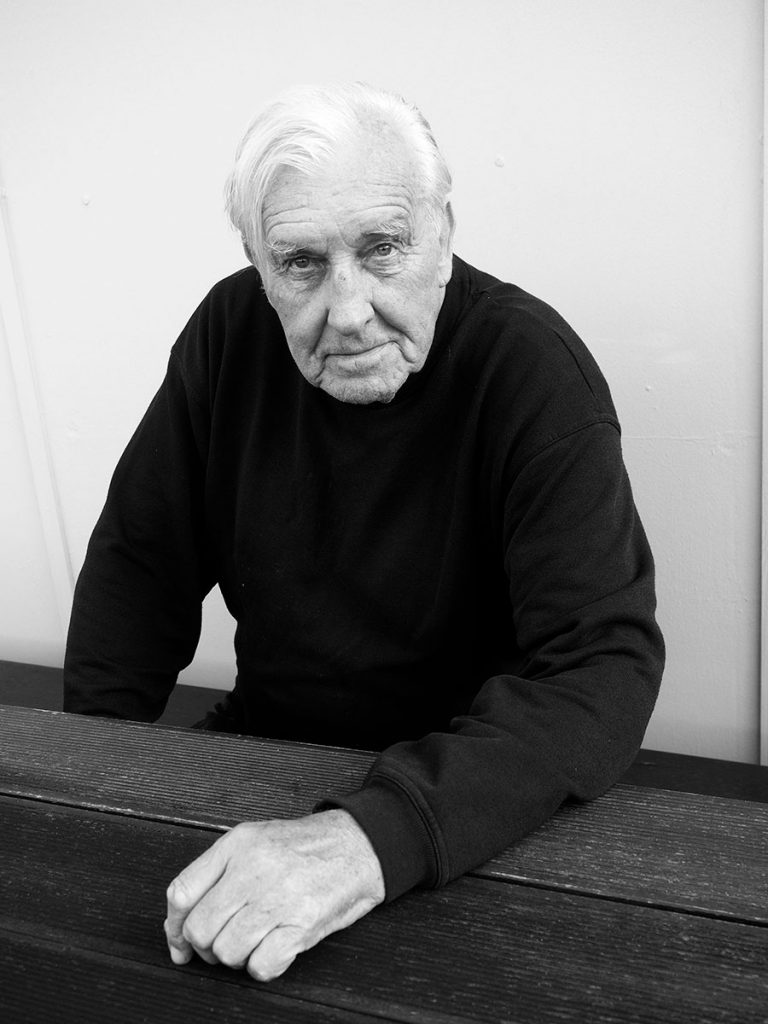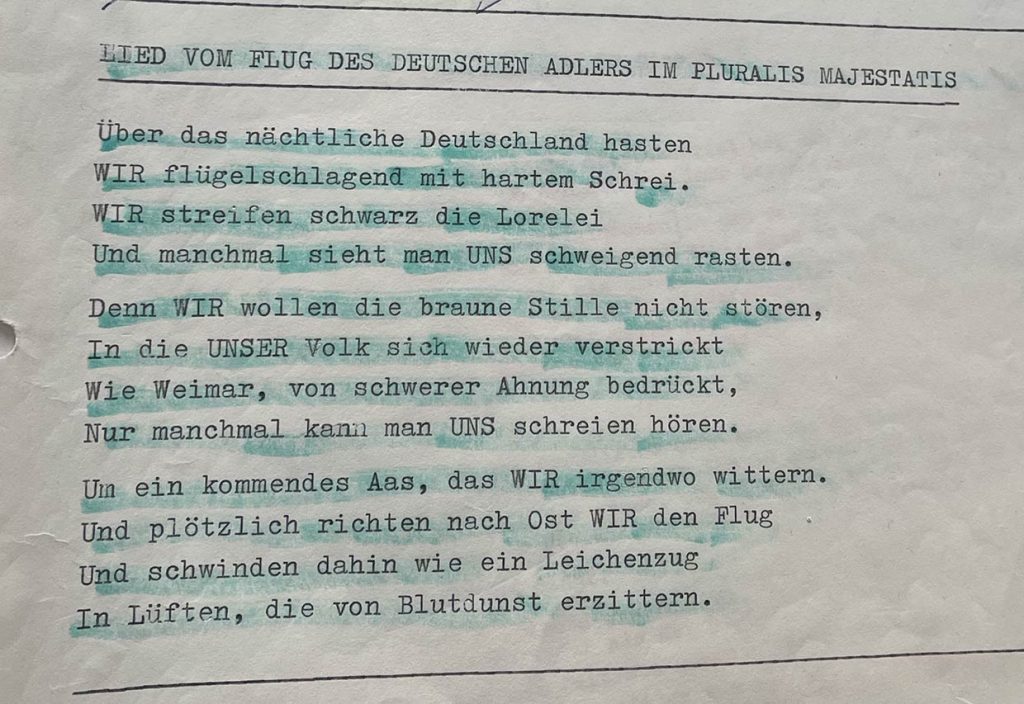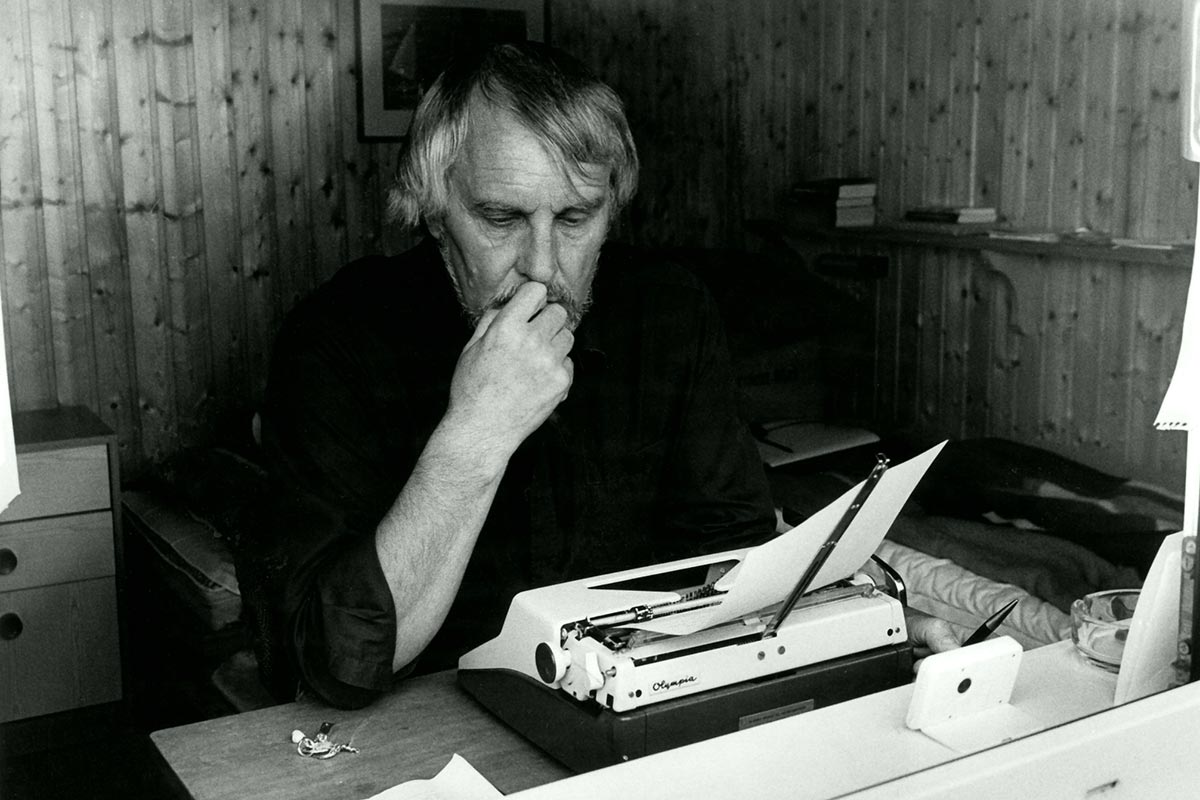Harald Mueller’s oeuvre is a substantial piece of German theatre literature and contemporary history. This website aims to give a brief overview of his work and background.

Writing and directing
Theatre has been Harald Mueller’s passion and purpose in life since his school days. At the age of 15, he was already leading a theatre group of the Boy Scouts. Throughout his life he has written whenever and wherever possible. By hand, with a typewriter, never on a computer. Harald Muller has been working on new plays until the end. He also had a talent for staging. He particularly often and gladly did this with actors and lay people in the context of the Klappholttal Summer Academy.
Plays
Harald Mueller’s plays are characterised by a gloomy, emphatically disillusioned mood – all the way to the post-apocalypse. Even the debut “Großer Wolf” (Great Wolf) points in this direction: Man is man’s wolf. The use of the German idiom is deliberately weighty, earthy, hard. Few can use language in such a way, be so skilfully vulgar, translated into 19 languages, a German Bukowski. At the latest since “Totenfloss” (Raft of the Dead), for a time one of the most frequently performed plays on German stages, Harald Mueller has been one of the internationally famous playwrights. Especially in Russia, but also in Germany and France, his works are regularly staged to this day.
Origin
Harald Waldemar Mueller was born in 1934 in Memel on the Baltic coast in Lithuania, now Klaipėda. His family had a close connection to Russia: his German-born grandfather had lived in St. Petersburg (since then the Muellers have spelt themselves with “ue”) and experienced the October Revolution there as a civil servant in the telegraph office. In 1918, the family moved to Memel, which at that time belonged to the German Reich. During the Second World War they fled further west and settled in Lütjenburg (Holstein).

Oeuvre
Harald Mueller’s works essentially comprise 22 plays:
1969 Großer Wolf (Premiere 1970)
1969 Halbdeutsch (Pr. 1970)
1973 Stille Nacht (Pr. 1974)
1974 Strandgut
1975 Winterreise (Pr. 1976)
1976 Rosel
1977 Henkersnachtmahl
1978 Frankfurter Kreuz
1979 Gaunerroulett
1980 Die Trasse
1981 Kohlhaas
1982 Der tolle Bomberg
1984 Totenfloß (Oberhauser Fassung, Endfassung: 1986)
1985 Ein seltsamer Kampf um die Stadt Samarkand (Pr. 1987)
1987 Bolero
1987 Bonndeutsch (Final version 1989/90)
1990 Das bunte Leben und der schwarze Tod von Waldorf
1992 Doppeldeutsch
1994 Kanzlersturz: Deutschdeutsches Geschäft
1995 Luther rufen (Pr. 1996)
1995 Die Magdeburger Hochzeit
1997 Luther rufen II, Freund Melanchthon
… followed by unpublished fragments:
Der Schützenkönig
Genopolis
Schattenkabinett
Genderspiel
Soundcheck
In addition, he has written several translations of George Bernard Shaw (e. g. ”Pygmalion“), Edward Bond, Anthony Burgess and Israel Horovitz, commissioned works, adaptations and radio plays.
Harald Muellers plays are published by Rowohlt Theaterverlag in German and several publishers in other languages, radio plays at Suhrkamp.
Sylt
The artists’ colony and summer academy in Klappholttal on Germany’s northernmost isle of Sylt was Harald Mueller’s chosen home for many years. The daily swim in the cold North Sea, writing in a small hermitage, the solitude of the dunes, but also the social exchanges and productions with the summer guests, were formative parts of his life. In his later days, the author lived in Berlin.
Family
Harald’s father was a banker, his mother a secretary. In 1939 – Harald was five years old – his father, Waldemar, went to war and returned ten years later a broken man. The mother, Erna, had to support the family alone. Neither of his younger brothers lived to an old age: Hans-Peter Mueller went to Canada and died there in a car accident at the age of 23; Wolfgang Mueller, an opera singer, died of Aids in the 1980s. Harald Mueller was married twice, his three adult daughters each come from different relationships.

Early Years
As a young man, Harald Mueller worked in various different odd jobs, be it as a miner, trade fair representative or interpreter, but also as a reciter and as a radio play and television writer. In 1955 he began his training as an actor in Munich and Hamburg and studied German and theatre studies. After a year in Canada, where he settled his brother’s estate, acting no longer seemed to suit him; he now wanted to write. The young author was encouraged by Martin Walser, among others. His debut play “Großer Wolf” (Great Wolf, premiere: Münchner Kammerspiele, Claus Peymann) attracted attention. It received the Gerhart Hauptmann Prize and a scholarship from Suhrkamp Verlag. Since his second work, “Halbdeutsch” (Half-German), consolidated this success and secured Harald Mueller a place among the most notable young authors. From 1971 to 1974 he was employed as a dramaturge at the Schillertheater in Berlin.
Cinema
In Volker Schlöndorff’s film „Der plötzliche Reichtum der armen Leute von Kombach“ (The sudden wealth of the poor people of Kombach, 1971, >YouTube) Harald Mueller played the role of Johann Soldan. This moral picture of peasant life in the 19th century is about a robbery of a gold treasure, which, however, ends miserably. Johann hangs himself in captivity to escape his sentence. Harald Mueller was also involved in writing another of Schlöndorff’s screenplays: „Die Moral der Ruth Halbfass“ (The Morality of Ruth Halbfass).

Translations
Harald Mueller has translated several plays by George Bernard Shaw and Israel Horovitz (as co-translator) from English into German. The publishing rights are held by Suhrkamp (Shaw) and Felix Bloch Erben (Horovitz).
Totenfloß
Harald Mueller’s most successful play to date was “Totenfloss” (Dead Men’s Raft), published in 1984. The renowned critic Benjamin Heinrichs nominated it as play of the year in the Theatre Yearbook 1985 Jahrbuch Theater. The dark vision of a dystopian survival community after the apocalypse coincided with the global event of the Chernobyl disaster. Perhaps this is why the play is still performed particularly often in Russia and Ukraine today. “Totenfloss” has been translated into 12 languages.
The father and the war
Harald Mueller’s life is strongly shaped by the person of his lost father Waldemar. Because of his talent for languages, he was used as a translator and in propaganda during the Second World War. In the last days of the war, he sailed from Kiel into the Königsberg cauldron, but was able to flee from the Soviets to Sweden. After the end of the war, he was threatened with deportation as a prisoner of war to the Soviet Union in the course of the extradition of Baltic soldiers. The internees attempted to escape by committing mass suicide. Severely traumatised, Waldemar spent the rest of his life in Swedish and German psychiatric institutions, where he ultimately met his death through electroshock “therapy”. A deep mistrust of human nature and the desire for reconciliation with Russia remained important motives for Harald Mueller.

Literature
Harald Mueller’s Plays
Press samples:
• Benjamin Heinrichs: “Der Mann in den Dünen”, Die Zeit, June 7, 1985
• Dramatiker: “Rotzandkotz”, Der Spiegel, October 10, 1986
• “Viere reisen durch die tote Welt”, on the premiere of “Totenfloß”, Die Zeit, Oct 24, 1986
• Obituaryat spiegel.de, December 30, 2021
• Obituary at sueddeutsche.de, December 30, 2021
• Orbituary at Nachtkritik, December 30, 2021
• Obituary at Theater der Zeit, February 2022
On Wikipedia:
• https://de.wikipedia.org/wiki/Harald_Mueller
• https://de.wikipedia.org/wiki/Totenfloß
Science:
• Michaela Bürger-Koftis: “Das Drama als Zitierimperium – Zur Dramaturgie der Sprache bei Harald Mueller”, Röhrig Universitätsverlag, St. Ingbert 2005, ISBN 3-86110-393-1
